From Oscar of Between, Part 31B Excerpt
by
Betsy Warland
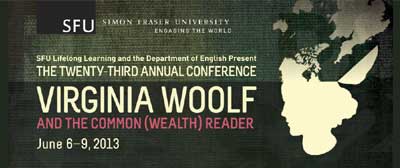
2013 Virginia Woolf Conference, SFU
October 2013. Oscar in Vancouver at the reception before the Virginia Woolf Conference banquet. Oscar nervous “in the extreme” (Orlando). As Oscar walks into the hotel convention lobby, she spots Miranda and Sharon (who’s also reading) huddled together by Helen, the conference chair. Helen offers to buy them a drink. Oscar confesses she’s socially inept in these situations, to which Miranda and Sharon confess similar feelings.
Oscar, who never socializes, eats nor drinks before a reading is doing all three. Hopes for the best for her reading is at least an hour and a half away.
Prior to the first course, Sharon reads from her book Pair of Scissors. The audience is astute and responsive to Sharon’s witty riff on Mrs. Dalloway. Oscar relaxes. Some.
Salad, animated conversation with Miranda and Sharon, then entree. Finally, plates are cleared. Liquids topped up. It’s time. Helen’s intro. Miranda’s intro: Oscar now at the mic. Begins reading her Orlando and Oscar alternating excerpts. Feels the room cohere, being in it together. Deep concentration punctuated by laughter at the humorous bits. When the banquet is over, Helen says to Oscar: “You could have heard a pin drop, even on this carpet!”
With the academy, and in her schooling prior, Oscar kept herself at arm’s length. Found the pursuit of knowledge in those halls was predictably routinized, defensively territorial, sorely lacking in authentic inquiry. In recent years, corporatization intensifying the academy’s commodity approach. Oscar relishing the freedom of inquiry, surprising confluences between her excerpts, her guests’ posted work and readers’ comments in her online salon.
In this month’s salon, Oscar posted an excerpt that included her reunion with her high school friends Margaret and Penny in Mexico two years ago. The similarities between their lives are few, yet something connects them beyond high school memories. On their second day Oscar realizes what it is. Directness. A characteristic in Midwest women that was non-existent then, and likely still is now.
Although Penny’s and Margaret’s lives are more conventional than Oscar’s, neither is traditional. On the third morning, as Oscar comes down the stairs for breakfast, Margaret determinedly steps out from the study and stands at the landing: “What happened? I’ve just finished reading Bloodroot and you didn’t say what happened after you went back for more tests about your breast.”
[halt]
Time stalls above them with no place to light.
Oscar’s been debating how to tell them but suddenly there’s no more debating. It’s now.
Instinctively, she takes Margaret’s hands in hers and places them firmly where her breasts used to be.
Margaret startles. “Ahh!” Removes her hands.
Then replies with conviction. “I’ve already thought about it. If I ever have breast cancer, I’m going to do the same thing.”
[pause]
Then. They erupt. Into laughter about the bizarre exchange they’ve just had.
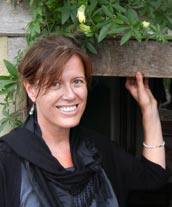
Photo credit: Alan Jamieson
Guest Writer:
Miranda Pearson
Vancouver, BC
www.mirandapearsonpoetry.com
to speak of a past that continues to blow through us? 1
their neat folded rolls, like strudel.
is a place best viewed from above.2
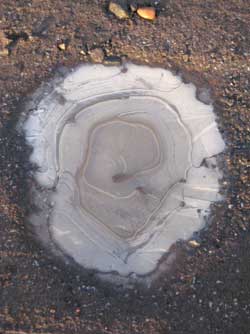
Photo credit: Miranda Pearson
Thinking Bloomsbury, Woolf, Canada. Between-ity. Together Adam and I look at the photo album, his childhood’s pictures: visiting Hever Castle, picnicing by the lake. That’s us watching the deer at Knole Park. After the hurricane of 1989, my mother said she’d noticed more deer in her garden and thought they had migrated over from Knole Park, seven miles away.
grey and brown, poised, some pulling at the dry grass.
Our arms outstretched we
my fingers long, yours small, pink.3
This poem was written in Banff, Alberta (not Banff, Scotland). I was surrounded by the Rockies, apart from my son, miles from Knole.
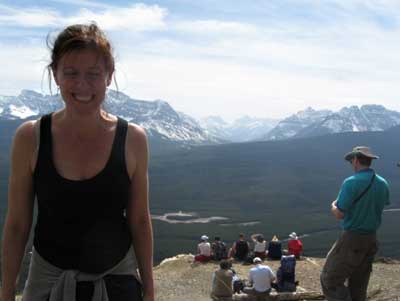
Photo credit: John Steffler
In Canada we climb mountains. In England we visit antique shops, museums and National Trust Castles. Join the coach tours to view the roped-off houses of the rich, admire the heaped cultural wealth looted from around the world.
if she has been greedy, like the British Museum, collected more
than she needed.
Sometimes she’d like to return all the artifacts, all the relics.4
Yet, the beautiful plundered is protected by these walls. We stand in the fast flowing river of violence and beauty … later we watch the BBC evening news, bewildered by the summer riots, kids smashing shop windows, running off with Nike shoes and TVs. Double-ness indeed.
1965—77, birthday parties we played hide-and seek in the corridors of Knole. The five Sackville-West sisters with their dark glossy hair, they would never own this gloomy pile – it went to a distant male cousin. Perhaps that would give them a freedom—if “what you hold, holds you.”5
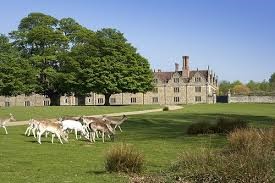
Photo credit: National Trust stock
As a teen growing up in Kent, I lay in the long grass of Knole Park, the tawny, spotted deer wandering by.
Of Knole, Woolf wrote:
“The heaviness, the excessive conscious beauty, Vita stalking down the corridors like a tall sailing-ship. All the centuries were lined up at Knole, and so we reach the days of Elizabeth quite easily.”7
Was I thinking of Knole in the poem “Property”?
its pretty tapestry: the dog with the pheasant in its mouth,
the woman in herself alone, her gold dress fettering her limbs …
the head doing the job the heart was raised to do.
Certainly it is Vita’s house Sissinghurst in “The Empress”:
wrapped in muslin, struggled to replant—
on a six-foot square balcony.9
“for now a thousand hints and mysteries became plain to her that then were dark.”10 Virginia’s last walk across the wheat fields near Monk’s house, and on, into the flat, banal river.
not of water’s dark closing
but about return. How nothing’s lost.
pulling at us
then letting loose, again.11
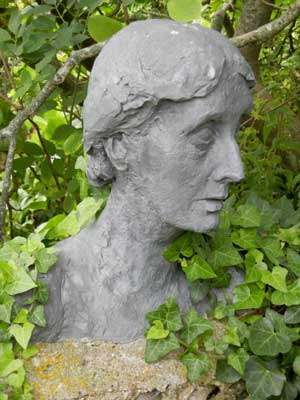
Photo credit: Alan Jamieson
1 “Conversations on Attachment” (The Fire Extinguisher)
2 “Element” (The Fire Extinguisher)
3 “Mother’s Day” (Harbour)
4 “The Empress” (The Aviary)
5 Tom Robbins
6 “Tofino” (Harbour)
7 Vita: The Life of Vita Sackville-West, Victoria Glendinning (p. 171)
8 “Property” (The Fire Extinguisher)
9 “The Empress” (The Aviary)
10 Orlando, Virginia Woolf (page 46)
11 “Sarsen” (Harbour)

Photo credit: James Loewen
Featured Reader:
Ethel Whitty
Vancouver, BC
I read Oscar’s Salon because
In the conference that Oscar attends they speak of the common wealth; that haunt of Virginia. Oscar speaks of a wealth that belongs to all of us but is far from common. Even as she stands outside the door of our shared experience, she cradles in her hands the thing we most want. Moments of love and consciousness and generosity are nestled in the folds and crevices of the sphere she carries. In her ability, like Orlando, to leap across the chasm between now and then she offers something that may be common to us all; something like flight. It is for this reason that I read Oscar Salon.
Profile
My work as Director of the Carnegie Centre in the Downtown Eastside is a passion. It competes with my close to finished novel for priority. In my work and my life I am surrounded by painters, singers, artists and musicians. All very human beings like myself.




I am struck by the way certain people weave themselves through out our lives. Oscar’s high school friends share common roots and a difference from most Midwestern women; a strong enough bond to incite a reunion many years later. At times, I have this same reunion with the words of writers I have devoured earlier in my life. I carry these books with me, literally and metaphorically, moving from apartment to house, town to city, because of this earlier connection. Both experiences offer a time to remind us of who we once were, where we came from, and how much we have changed.
Lovely interweaving, Miranda.
Miranda’s so evocative last excerpt: “the leash of place/pulling at us/then letting loose, again.” Oscar recognizes that doorway in which Miranda is standing in her author’s photo. Oscar recalls the sensation of that doorway when she lingered in when visiting Monk’s House.
Miranda finding ground in Canada; Oscar finding ground in the UK. Not replacing either’s original ground but rather an accessing of sensibilities we were not raised in. But, are drawn to.The exuberance of narratives on the loose!
After reading all of this I think that “yes, of course, the past is always blowing through us, isn’t it?” I certainly never thought of it so poetically.
I like this motif of weaving, both in the sense of how memory itself seems to move and also, how we are connected by these threads: a certain shared quality, the items we physically carry, the ideas that seem to mark us.
All of this asks me to pay better mind to what is weaving through me and sometimes, perhaps, what isn’t.
Fun to see this again!